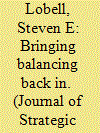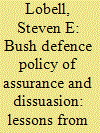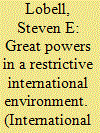|
|
|
Sort Order |
|
|
|
Items / Page
|
|
|
|
|
|
|
| Srl | Item |
| 1 |
ID:
117948


|
|
|
|
|
| Publication |
2012.
|
| Summary/Abstract |
This article challenges the conventional wisdom that Neville Chamberlain rejected the British tradition of balance of power in the 1930s. In contrast to balance of power and balance of threat theories, states do not balance against aggregate or net shifts in power. Instead, leaders define threats based on particular elements of a foreign state's power. The import is that different components of power of a foreign state are more or less threatening and aggregate shifts in power alone may not provoke counterbalancing behavior. In the 1930s, Britain balanced against the most threatening components of power: the German Luftwaffe and the threat of a knock-out air assault against the homeland, Japan's Imperial Navy and its threat to Britain's commercial trade routes and the Dominions in East Asia, and the Italian Navy and the threat to Britain's line of communication through the Mediterranean Sea to India and Asia. Given Britain's difficult financial circumstances, all other components of power, such as the army and the land components of power of Germany, Japan, and Italy were ranked as secondary in terms of its rearmament priorities. Thus, London was able to narrow the gap with Berlin in specific components of power of strategic importance such as aircraft production or to exceed Germany in other areas such as the Royal Navy and its battlefleet.
|
|
|
|
|
|
|
|
|
|
|
|
|
|
|
|
| 2 |
ID:
052251


|
|
|
|
|
| Publication |
Apr-Jun 2004.
|
|
|
|
|
|
|
|
|
|
|
|
|
|
|
|
| 3 |
ID:
123090


|
|
|
|
|
| Publication |
2013.
|
| Summary/Abstract |
STEVEN E. LOBELL argues that the Obama administration can learn from previous British and American policies of engagement. He looks at four cases that suggest trade concessions and commercial inducements, rather than punishment or ?rm balancing, may be more appropriate policy to moderate the behavior of states threatening U.S. interests.
|
|
|
|
|
|
|
|
|
|
|
|
|
|
|
|
| 4 |
ID:
161431


|
|
|
|
|
| Summary/Abstract |
Theories of balancing are under assault. On theoretical and historical grounds, realists and non-realists challenge the claim that states balance against shifts in aggregate material capabilities. In addressing these claims, this article presents a more granular and finely tuned theory of balancing. It contends that states do, in fact, balance effectively. While foreign policy leaders regularly ignore aggregate power developments, they do disaggregate power to identify threatening states and target their balancing against specific threatening elements. Targeted-balancing theory explains why some historical cases coded as under-balancing are really instances of appropriate balancing; why a more powerful state's military buildup, or alliance formation against a weaker state, can constitute balancing; and why some instances of non- or missing-balancing against a more powerful state do not undermine balance-of-power theory. I provide support for my claims through an analysis of Britain's balancing against Germany and Italy between 1936 and 1939. Rather than under-balancing, or failing to balance altogether, London target-balanced against the specific threatening elements of German and Italian power. Given that power is rarely fungible across elements, London ranked other components of their power as secondary, and even last, in terms of Britain's rearmament priorities.
|
|
|
|
|
|
|
|
|
|
|
|
|
|
|
|
| 5 |
ID:
106832


|
|
|
| 6 |
ID:
180373


|
|
|
|
|
| Summary/Abstract |
There is much debate about the impending collapse of the liberal international order. It is provoked by the shifts in material and military capabilities from emerging peer and near-peer competitors, some of whom were not part of the original grand bargain and others that are in a stronger position to renegotiate the bargain. As one critical element of the liberal international order, we ask, during power shifts: is the liberal international trading order (LITO) durable and resilient? When and why will the LITO collapse? Does the relative decline of the hegemon alone explain these outcomes? In advancing a second-image reversed plus argument, we highlight how a shift in the nature of the foreign commercial orientation of peer and near-peer contenders can alter the domestic balance of power of two broad and logrolled coalitions competing to capture the state and thus affect whether the erstwhile leader defends, renegotiates, or abandons the trading order it created. To better understand these forces, we examine two paradigmatic cases: Britain in the 1930s and the United States in the 2000s.
|
|
|
|
|
|
|
|
|
|
|
|
|
|
|
|
| 7 |
ID:
072693


|
|
|
|
|
| Publication |
2006.
|
| Summary/Abstract |
How does war affect the structure of domestic interests in democratic capitalist states and how are these interests reflected in the conduct of the war? Developing a second image reversed 'plus' argument (outside-in and then inside-out), I contend that war can alter the domestic balance of political power, and can thereby affect the orientation of a state's security strategy. Wars that induce the extraction of wealth and the mobilization of resources will empower a coalition of domestic actors and interest groups who will lobby the government for an offensive security policy, including greater defense spending, military and industrial conscription, state planning and intervention in the economy, and protectionism. I apply this model to Britain and use a research design based on a longitudinal-controlled comparison over the periods of 1912-1914 and 1914-1916 to examine why Britain escalated its involvement in World War I from Limited Liability prior to the outbreak of the war and during the initial years of the war to a Continental Commitment by April of 1916.
|
|
|
|
|
|
|
|
|
|
|
|
|
|
|
|
| 8 |
ID:
081294


|
|
|
|
|
| Publication |
2008.
|
| Summary/Abstract |
Great powers can pursue deliberate "Trojan horse" policies to transform rising and geostrategic secondary states into followers and supporters, rather than challengers. I contend that a great power can use economic statecraft, and in particular trade agreements, to deliberately promote shifts in the societal distribution of power in a target country. The intent is to strengthen the political power of societal and economic actors who have a stake in deepening international ties, while opponents of such policies will be weakened politically and economically. The societal winners will then apply pressure on the government to support their preferred outward-oriented grand strategy. I term this process the "second face of security," since it entails a less direct and more nuanced method of creating security. In contrast, the "first face of security" entails direct attempts to create security by influencing other governments through military or economic statecraft. I apply this model to the case of Jordan and argue that Washington has used trade agreements to strengthen the outward-oriented internationalist bloc in order to assist the palace in its domestic and international realignment toward commercial liberalization, political democratization, and normalization of relations with Israel.
|
|
|
|
|
|
|
|
|
|
|
|
|
|
|
|
| 9 |
ID:
084568


|
|
|
|
|
| Publication |
2008.
|
| Summary/Abstract |
Great powers can pursue deliberate Trojan horse policies to transform rising and threatening states into followers and supporters rather than challengers by altering their domestic political and economic institutions. I contend that a great power can use trade concessions, rather than punishment, to enable a favorable foreign policy coalition in a target country. The intent is to strengthen the political power of state and societal elites who have a stake in deepening international ties, while opponents of such policies will be weakened politically and economically. The societal winners will then apply pressure on the government to support their preferred outward-oriented grand strategy. I term this process the second face of security since it entails a less direct and more nuanced method of creating security. I examine Britain's commercial policies toward Germany and Japan during the 1930s to better understand second-face strategies. I argue that the intent of Britain's industrial and commercial policy was to strengthen conservative business, government officials, and economic circles in banking, light industry, and finished goods, and even heavy industry in order to steer Berlin and Tokyo away from rearmament, extreme autarky, and war
|
|
|
|
|
|
|
|
|
|
|
|
|
|
|
|
| 10 |
ID:
193162


|
|
|
|
|
| Summary/Abstract |
In 1981, Israel launched a preventive military strike against a nuclear reactor that Iraq was constructing at the Tuwaitha Nuclear Research Center. The low fungibility of Iraq’s power resources, and especially its nuclear weapons program, shaped Israel’s decision-making process. First, it motivated Israel’s executives to disaggregate Iraq’s capabilities. Though they identified Baghdad’s emerging nuclear weapons program as a threat, there was little pressure to act more broadly. Second, it pushed Israel’s leaders to favour delaying strategies to stall Iraq’s program. Third, it motivated Israel’s leaders to favour a preventive military strike to delay Iraq’s nuclear program from becoming more fungible.
|
|
|
|
|
|
|
|
|
|
|
|
|
|
|
|
| 11 |
ID:
106046


|
|
|
|
|
| Publication |
2011.
|
| Summary/Abstract |
eginning in the late 1960s and early 1970s, the United States discussed or extended capital and technology, Most Favoured Nation (MFN) tariff treatment, Export-Import Bank financing, and long-term credit to the Soviet Union and China. This strategy raises three questions: First, why did the United States extend concessions to rival great powers when, under the more restrictive international environment of the 1970, it viewed Moscow's growing aggregate economic power and military capability, and especially its emerging nuclear strategic parity in ICBMs, and China's ideological challenge to the West as threats? 1 Second, why, under this restrictive environment, did U.S. engagement with China and the Soviet Union make greater advances, resulting in major treaties on arms control such as the SALT Agreements, Basic Principals Agreement, Helsinki Agreement, and Agreement on the Prevention of Nuclear War, and the normalization of Sino-American relations, than in previous periods? Third, and a point scholars often neglect, what role did Beijing and Moscow play in guiding American foreign policy towards China and the Soviet Union?
|
|
|
|
|
|
|
|
|
|
|
|
|
|
|
|
|
|
|
|
|